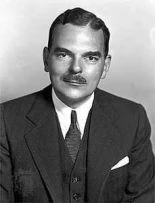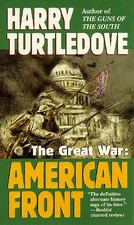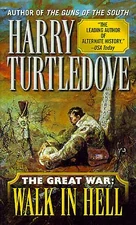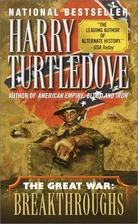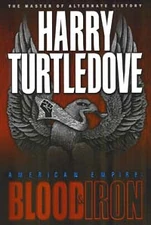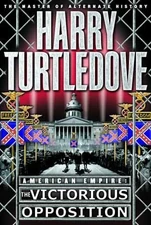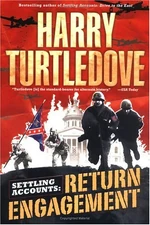| ||||||||||||||||||||||||||||
Thomas Edmund Dewey (March 24, 1902 – March 16, 1971) was the Governor of New York (1943-1955) and the unsuccessful Republican Party candidate for the U.S. Presidency in 1944 and 1948. As a leader of the liberal faction of the Republican Party he fought the conservative faction led by Senator Robert Taft.
During the 1930s, Dewey made a name for himself as a fearless prosecutor, actively trying and convicting several key organized crime figures of New York City.
He is well remembered in popular culture for being incorrectly announced by the Chicago Tribune as the presidential winner in 1948, over Harry Truman, who then celebrated this reversal of fortune in an iconic photograph.
Thomas Dewey in The Man With the Iron Heart[]
| The Man With the Iron Heart POD: May 29, 1942; Relevant POD: May, 1945 | |
| Type of Appearance: | Contemporary reference |
| Political Office(s): | Governor of New York |
Despite having lost the 1944 election, Governor Thomas Dewey was one of several Republicans whose name was bandied about as a possible presidential candidate in 1948.[1]
Thomas Dewey in Joe Steele[]
Thomas Dewey was a Republican politician from New York. He'd begun as a crusading district attorney before becoming the Governor of New York. He sought the GOP nomination for the presidency in 1940 but lost out to Wendell Willkie.[2]
| Joe Steele POD: 1878; Relevant POD: July, 1932 | |
| Novel or Story?: | Novel only |
| Type of Appearance: | Direct |
| Political Office(s): | Governor of New York |
He did gain the GOP nod in 1944, running against incumbent Joe Steele, who was running for an unprecedented fourth term. While Dewey campaigned hard, promising to do better in the war and to do away with the labor camps Steele had established in the country, it was difficult to campaign substantively against Steele's successes: World War II was going absolutely in the Allies' favor, while at home, the economy was in great shape, with people now earning more than they had before Steele took office in 1933. People had generally come to accept the camps, and were indifferent to Dewey's call for their end.[3] Moreover, Steele's apparatus was difficult to contend with. In the end, Steele trounced Dewey.[4] In his concession speech, Dewey wished Steele well, because wishing the President well meant wishing the country well, and Dewey loved the U.S. as he knew Steele did as well.[5]
Literary comment[]
Dewey is not mentioned in the short story, where Steele ran unopposed in 1944.
Thomas Dewey in Southern Victory[]
| Southern Victory POD: September 10, 1862 | |
| Appearance(s): | In at the Death |
| Type of Appearance: | Direct |
| Spouse: | Unnamed wife |
| Political Party: | Democratic Party |
| Political Office(s): | Governor of New York, President of the United States |
Thomas E. "Tom" Dewey was elected the 34th President of the United States in 1944 on the Democratic ticket.
Dewey rose to prominence first as a prosecutor[6] in New York City, and then as Governor of New York State during the Second Great War.[7] An able and very popular politician, Dewey became the obvious choice to challenge the incumbent Socialist, President Charles W. La Follette. Despite the fact that La Follette had led the country to victory in the Second Great War, Dewey successfully ran on a platform that the Socialists had allowed the Confederacy to regain its strength under Jake Featherston, and so were directly responsible for the gains the C.S. made under Operation Blackbeard in 1941.[8]
At his inauguration on February 1, 1945, Dewey pledged to continue U.S. occupation of the C.S. with the intent to integrate the southern states back into the U.S. He also pledged to continue La Follette's policy of racial equality in the armed services. Addressing the international stage, Dewey proposed a continued partnership with the U.S.'s traditional ally, Germany, to police the world and prevent the spread of superbomb technology to former enemies Russia, Japan, and France.[9]
Dewey's Vice President was Harry Truman.
Trivia[]
- Dewey was elected at the age of 42, tying with Upton Sinclair (who also defeated a sitting President who had led the US to victory in a major war) as the youngest man to win a Presidential election.
- Dewey was the first President born in the 20th century. (Sinclair had been the first President born after the War of Secession.)
- Following Dewey's overwhelming election victory, his running mate, Harry S Truman, presented a copy of the Chicago Tribune bearing the headline "La Follette Beats Dewey".[10]
See Also[]
- Dwight D. Eisenhower, general of World War II, and the 34th President of the United States in OTL, serving from 1953 to 1961.
- Franklin D. Roosevelt, 32nd President of the United States in OTL. He defeated Thomas Dewey in the 1944 election.
- Harry Truman, the 33rd President of the United States in OTL. He ascended to the Presidency upon Roosevelt's death in 1945. Truman, a Democrat, defeated the Republican Dewey in the 1948 election (unlike the Southern Victory series, where Truman was Dewey's running mate on a Democratic ticket). Based on faulty polling data, the Chicago Tribune printed headlines proclaiming "Dewey Defeats Truman", which was echoed in the Southern Victory series.
- Harold Stassen, the Republican Presidential nominee in the 1948 election in the novel Joe Steele.
References[]
- ↑ The Man With the Iron Heart, pg. 353.
- ↑ Joe Steele, pg. 225.
- ↑ Ibid., pg. 295-296.
- ↑ Ibid., pgs. 296-298.
- ↑ Ibid., pg. 298.
- ↑ In at the Death, pg. 464
- ↑ Ibid. 526
- ↑ Ibid.
- ↑ Ibid. 594-596.
- ↑ Ibid. pg. 528.
| Titles and Succession | |||||||||||||||||||||||||||||||||||||||
|---|---|---|---|---|---|---|---|---|---|---|---|---|---|---|---|---|---|---|---|---|---|---|---|---|---|---|---|---|---|---|---|---|---|---|---|---|---|---|---|
| |||||||||||||||||||||||||||||||||||||||
